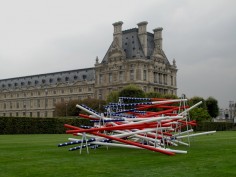Mounir Fatmi
منير فاطمي
source: mounirfatmi
Né en 1970 à Tanger, vit et travaille entre Paris et Tanger.
mounir fatmi construit des espaces et des jeux de langage. Son travail traite de la désacralisation de l’objet religieux, de la déconstruction, de la fin des dogmes et des idéologies. Il s’intéresse spécialement à l’idée de la mort de l’objet de consommation. Cela peut s’appliquer à des machines photocopieurs, des câbles d’antennes, des cassettes VHS, une langue morte ou à un mouvement politique. Ses vidéos, installations, peintures ou sculptures mettent au jour nos ambiguïtés, nos doutes, nos peurs, nos désirs. Ils pointent l’actuel de notre monde, ce qui survient dans l’accident et en révèle la structure. L’œuvre de mounir fatmi offre un regard sur le monde à partir d’un autre angle de vue, en refusant d’être aveuglé par les conventions.
Son travail a été présenté au sein de nombreuses expositions personnelles, au Migros Museum für Gegenarskunst, Zürich, au Musée Picasso, la guerre et la paix, Vallauris, au FRAC Alsace, Sélestat, au centre d’art contemporain le Parvis, à la Fondazione Collegio San Carlo, Modena.
Il a participé à plusieurs expositions collectives au Centre Georges Pompidou, Paris, Brooklyn Museum, New York, Museum Kunst Palast, Düsseldorf, Mori Art Museum, Tokyo, Museum on the Seam, Jerusalem, Moscow Museum of modern art, Moscou, Mathaf, Arab Museum of Modern Art, Doha, ainsi qu’à la Hayward Gallery, Londres.
Ces installations on été sélectionnées dans le cadre de plusieurs biennales, la 52ème et la 54e Biennale de Venise, la 8ème Biennale de Sharjah, la 5éme et la 7éme biennale de Dakar, la 2ème Biennale de Séville, la 5ème Biennale de Gwangju, la 10ème Biennale de Lyon.
Il a reçu plusieurs prix dont le prix de la Biennale du Caire, en 2010. Le Uriôt prize, Amsterdam, ainsi que le Grand Prix Léopold Sédar Senghor de la 7ème Biennale de Dakar en 2006.
.
.
.
.
.
.
.
source: mounirfatmi
Born 1970, Tangier, Morocco, lives and works between Paris and Tangier.
mounir fatmi constructs visual spaces and linguistic games.His work deals with the desecration of religious object, deconstruction and the end of dogmas and ideologies. He is particularly interested in the idea of death of the subject of
consumption. This can be applied to antenna cables, copier machines, VHS tapes, and a dead language or a political movement. His videos, installations, drawings, paintings and sculptures bring to light our doubts, fears and desires. They directly address the current events of our world, and speak to those whose lives are affected by specific events and reveals its structure. Mounir Fatmi’s work offers a look at the world from a different glance, refusing to be blinded by the conventions.
mounir fatmi’s work has been shown in numerous solo exhibition, in the Migros Museum für Gegenwarskunst, Zürich, Switzerland, at the PIcasso Museum, war and peace, Vallauris, at the FRAC Alsace, Sélestat, at the Contemporary Art Center Le Parvis, at the Fondazione Collegio San Caro, Modena.
He participated in several collective shows at the Centre Georges Pompidou, Paris,The Brooklyn Museum, New York, Museum Kunst Palast, Düsseldorf, Mori Art Museum in Tokyo,
Museum on the Seam, Jerusalem, Moscow Museum of Modern Art, Moscow, Mathaf Arab Museum of Modern Art, Doha and the Hayward Gallery, London.
His installations have been selected in biennials such as the 52nd and 54th Venice Biennial, the 8th biennial of Sharjah, the 5th and 7th Dakar Biennial, the 2nd Seville Biennial, the 5th Gwangju Biennial and the 10th Lyon Biennial.
Mounir Fatmi was awarded by several prize such as the Cairo Biennial Prize in 2010, the Uriöt prize, Amsterdam and the Grand Prize Leopold Sedar Senghor of the 7th Dakar Biennial in 2006.


